
Familial Cancer
Scope & Guideline
Advancing insights into hereditary cancer.
Introduction
Aims and Scopes
- Genetic predisposition to cancer:
The journal emphasizes research on hereditary cancer syndromes, including the identification and characterization of genetic variants associated with increased cancer risk. - Screening and surveillance strategies:
A core area of focus is the development and evaluation of screening protocols for high-risk individuals, particularly those with familial cancer syndromes like Lynch syndrome and hereditary breast and ovarian cancer. - Clinical management and interventions:
The journal addresses clinical strategies for the management of hereditary cancers, including risk-reducing surgeries, chemoprevention, and personalized treatment approaches based on genetic profiles. - Psychosocial aspects of genetic testing:
Research on the psychological impact of genetic testing and the experiences of patients and families navigating hereditary cancer risk is an important theme, highlighting the need for supportive care. - Policy and healthcare delivery:
The journal also explores healthcare policy implications and the integration of genetic testing into clinical practice, focusing on improving access and equity in cancer care.
Trending and Emerging
- Integration of genomic technologies:
Recent studies increasingly utilize advanced genomic techniques, such as whole genome sequencing and multi-gene panels, to identify hereditary cancer syndromes and characterize variants, reflecting the growing importance of precision medicine. - Cascade testing and family communication:
There is a rising emphasis on cascade genetic testing and the psychosocial dynamics of communicating genetic risk within families, highlighting the importance of family involvement in hereditary cancer management. - Health disparities and access to care:
Emerging themes include the examination of health disparities in access to genetic testing and cancer care, particularly among underrepresented populations, which is critical for equitable healthcare delivery. - Long-term outcomes and survivorship:
Studies focusing on long-term outcomes for individuals with hereditary cancer syndromes, including survivorship issues and quality of life, are becoming more prominent, addressing the holistic needs of patients post-diagnosis. - Digital health innovations:
The integration of digital health tools for cancer risk assessment and genetic counseling is a trending area of research, reflecting a shift towards technology-driven solutions in healthcare.
Declining or Waning
- Non-genetic factors in cancer risk:
There has been a noticeable decrease in studies focusing on environmental or lifestyle factors contributing to familial cancer risk, suggesting a shift towards more genetic and molecular investigations. - Rare cancer syndromes:
Research on less common hereditary cancer syndromes, while still relevant, has seen a decline in frequency, as the journal's focus has increasingly gravitated towards more prevalent syndromes like Lynch syndrome and BRCA-related cancers. - General population studies:
The journal appears to be moving away from large-scale studies of general populations in favor of targeted research in specific high-risk groups, potentially reducing the breadth of its epidemiological coverage.
Similar Journals
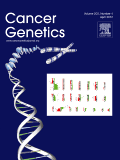
Cancer Genetics
Unraveling the Genetic Mysteries of CancerCancer Genetics is an esteemed peer-reviewed journal dedicated to advancing the field of cancer research through the lens of genetics. Published by Elsevier Science Inc and available in both print (ISSN: 2210-7762) and online (E-ISSN: 2210-7770), this journal aims to provide a platform for the dissemination of high-quality studies that unravel the genetic underpinnings of cancer. Since its inception in 2011, Cancer Genetics has become a significant resource for researchers, professionals, and students with a shared interest in understanding the intricate relationship between genetics and oncogenesis. With an impact factor that reflects its influence, the journal has maintained a Q3 ranking in Cancer Research, Genetics, and Molecular Biology as of 2023, indicating its growing importance in these fields. Additionally, the journal offers open access options to ensure that crucial findings are easily accessible to the global research community. By bridging the gap between genetics and cancer studies, Cancer Genetics plays a pivotal role in fostering innovation and collaboration among scientists and clinicians striving to improve cancer diagnosis and treatment.
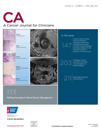
CA-A CANCER JOURNAL FOR CLINICIANS
Delivering Essential Knowledge for Oncology and Hematology ExpertsCA: A Cancer Journal for Clinicians is a prestigious academic journal published by Wiley, serving as a leading source of evidence-based information for those in the fields of oncology and hematology. With an impressive impact factor and ranked in the top quartile (Q1) for both specialties, this journal aims to bridge the gap between the latest research findings and clinical practice. Established in 1950, it boasts a long-standing history of delivering essential insights, guidelines, and innovative strategies to healthcare professionals worldwide, making significant contributions to the understanding and treatment of cancer. Although it does not offer open access, its published content is crucial for researchers, clinicians, and students dedicated to advancing cancer care. The journal's commitment to excellence is reflected in its elite rankings, holding the #1 position in both the Medicine – Oncology and Medicine – Hematology categories according to Scopus, positioning it in the 99th percentile of scholarly impact.
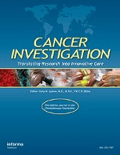
CANCER INVESTIGATION
Exploring the frontiers of cancer research with precision.CANCER INVESTIGATION is a distinguished peer-reviewed journal published by Taylor & Francis Inc, dedicated to the advancing field of cancer research and oncology. With an ISSN of 0735-7907 and E-ISSN of 1532-4192, this journal has been a pivotal resource for professionals and researchers since its inception in 1983, continually contributing to the evolving landscape of cancer investigation until its convergence in 2024. CANCER INVESTIGATION boasts noteworthy rankings in 2023, including Q3 in Cancer Research and Q2 in Medicine (miscellaneous), highlighting its relevance and impact in these critical areas. The journal's commitment to disseminating innovative research and comprehensive reviews makes it an essential platform for those engaged in cancer studies and related disciplines. While currently not available as an open-access publication, CANCER INVESTIGATION remains an invaluable tool for understanding the complexities of cancer, offering insights that drive scientific advancements and improve patient outcomes.
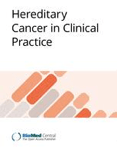
Hereditary Cancer in Clinical Practice
Fostering Dialogue in Hereditary Cancer StudiesHereditary Cancer in Clinical Practice, published by BMC in the United Kingdom, is a prominent open access journal dedicated to advancing knowledge in the realms of clinical genetics and oncology. Established in 2003, the journal has positioned itself as a vital resource for researchers, clinicians, and students interested in the genetic underpinnings of cancer and its implications for patient care. With a Q3 ranking in Genetics (Clinical) and a Q2 ranking in Oncology for 2023, the journal emphasizes high-quality, peer-reviewed articles that foster dialogue and innovation in hereditary cancer research. Furthermore, its commitment to open access ensures that the latest findings and methodologies are readily available to the global academic community, reflecting a broader trend toward accessibility in scientific literature. From 2004 to 2024, it aims to host a diverse array of studies, reviews, and clinical reports that are integral to understanding the complexities of hereditary cancer, making it an essential platform for those dedicated to unraveling these intricate challenges.

BRITISH JOURNAL OF CANCER
Advancing Cancer Knowledge Through Rigorous Research.The British Journal of Cancer, published by SpringerNature, stands as a preeminent resource in the fields of Cancer Research and Oncology, with a distinguished history of publication dating back to 1947. With its Q1 rank in both categories for 2023, this journal is among the top-tier publications, offering cutting-edge research and insights into the biology, etiology, and treatment of cancer. The journal’s rigorous peer-review process ensures that readers are presented with high-quality studies that contribute to the advancement of cancer knowledge and clinical practice. Operating from the United Kingdom, it has garnered a notable impact factor and ranks impressively within Scopus, making it an essential publication for researchers, healthcare professionals, and students who are dedicated to understanding cancer's complexities. Access to the journal's articles is available in traditional formats, providing a versatile platform for disseminating pivotal research. As we move towards a future where cancer treatment and prevention remain crucial, the British Journal of Cancer continues to play a vital role in shaping the dialogue and discoveries within the oncology community.
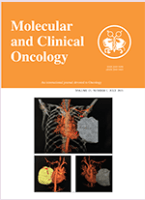
Molecular and Clinical Oncology
Uncovering the molecular secrets of oncology.Molecular and Clinical Oncology is a dynamic journal published by SPANDIDOS PUBL LTD, aimed at advancing the understanding of cancer biology and treatment modalities. With an ISSN of 2049-9450 and an E-ISSN of 2049-9469, the journal serves as a critical platform for researchers and clinicians dedicated to uncovering novel insights in molecular oncology and enhancing clinical practices. As a testament to its growing influence, the journal has achieved a Q3 ranking in Oncology and a Q4 ranking in Cancer Research for the year 2023, reflecting its commitment to publishing high-quality research. Although currently not an Open Access publication, the journal offers crucial subscription options, ensuring comprehensive access to groundbreaking studies and innovations in the field. With converged years spanning 2018 to 2024, the journal is set to continue enriching the academic community with its valuable contributions, ultimately empowering researchers, professionals, and students engaged in the fight against cancer.

CANCER
Unveiling breakthroughs in oncology since 1948.CANCER, published by Wiley, stands as a pivotal journal in the field of oncology and cancer research, boasting an impressive impact factor and consistently dynamic growth since its inception in 1948. With an ISSN of 0008-543X and an E-ISSN of 1097-0142, this esteemed journal is recognized for its rigorous peer-reviewed articles, making significant contributions to the understanding of cancer biology, treatment modalities, and clinical practices. CANCER holds a distinguished position in the academic community, securing its placement in the Q1 category for both cancer research and oncology, and ranks within the top percentiles on Scopus, indicating its high impact and relevance. The journal is particularly beneficial for researchers, professionals, and students seeking to stay abreast of the latest advancements in cancer science. By addressing essential research questions and providing pathways for new therapies, CANCER continues to play a crucial role in shaping the future of oncology and improving patient outcomes.

CANCER CAUSES & CONTROL
Exploring the Intersections of Cancer Research and Public HealthCancer Causes & Control, an esteemed journal within the field of Cancer Research and Oncology, is published by SPRINGER. Since its inception in 1990, this journal has dedicated itself to exploring the complex interplay between environmental, genetic, and lifestyle factors that contribute to cancer causation and control, aiming to inform public health initiatives and improve cancer prevention strategies. With an impressive Q2 rank in both its categories, the journal serves as a vital resource for researchers, professionals, and students seeking insights into the latest findings and methodologies in cancer epidemiology. Although there is no Open Access option, researchers can access valuable articles that reflect rigorous peer review and significant contributions to the field. The journal’s commitment to advancing knowledge related to cancer risks and management makes it an essential platform for disseminating impactful research and fostering collaboration among scholars worldwide.

Frontiers in Oncology
Empowering breakthroughs in cancer treatment and care.Frontiers in Oncology is a premier open access journal dedicated to advancing the field of oncology through innovative research and knowledge dissemination. Published by FRONTIERS MEDIA SA since 2011, this journal is based in Switzerland and holds an impressive Q2 ranking in both Cancer Research and Oncology as of 2023, highlighting its significance in the academic community. With its commitment to open access, Frontiers in Oncology ensures that vital research is readily available to researchers, healthcare professionals, and students around the globe, enhancing collaboration and fostering breakthroughs in cancer research. The journal's robust Scopus rankings further illustrate its academic influence, with notable positions in the fields of Oncology and Cancer Research. By covering a wide range of topics within oncology, this journal serves as a vital resource, supporting the rapid evolution of cancer treatment, diagnostics, and patient care strategies.

Journal of the Egyptian National Cancer Institute
Advancing cancer research, one article at a time.Journal of the Egyptian National Cancer Institute, published by SPRINGER, serves as a vital platform for disseminating innovative research in the field of oncology and cancer research. With both ISSN 1110-0362 and E-ISSN 2589-0409, this Open Access journal has been committed to making significant contributions to the scientific community since its inception in 2005. Operating from its base in Egypt, it has established itself as an important resource for researchers, practitioners, and students alike, offering insights into contemporary issues and advancements in cancer care. Recognized in the 2023 category quartiles as Q3 in Cancer Research and Q3 in Oncology, the journal is positioned to impact the ongoing discourse in cancer treatment strategies and health policy. As it continues to publish peer-reviewed articles through available Open Access avenues, the Journal of the Egyptian National Cancer Institute remains dedicated to enhancing the knowledge base and collaborative efforts within the global cancer research community.